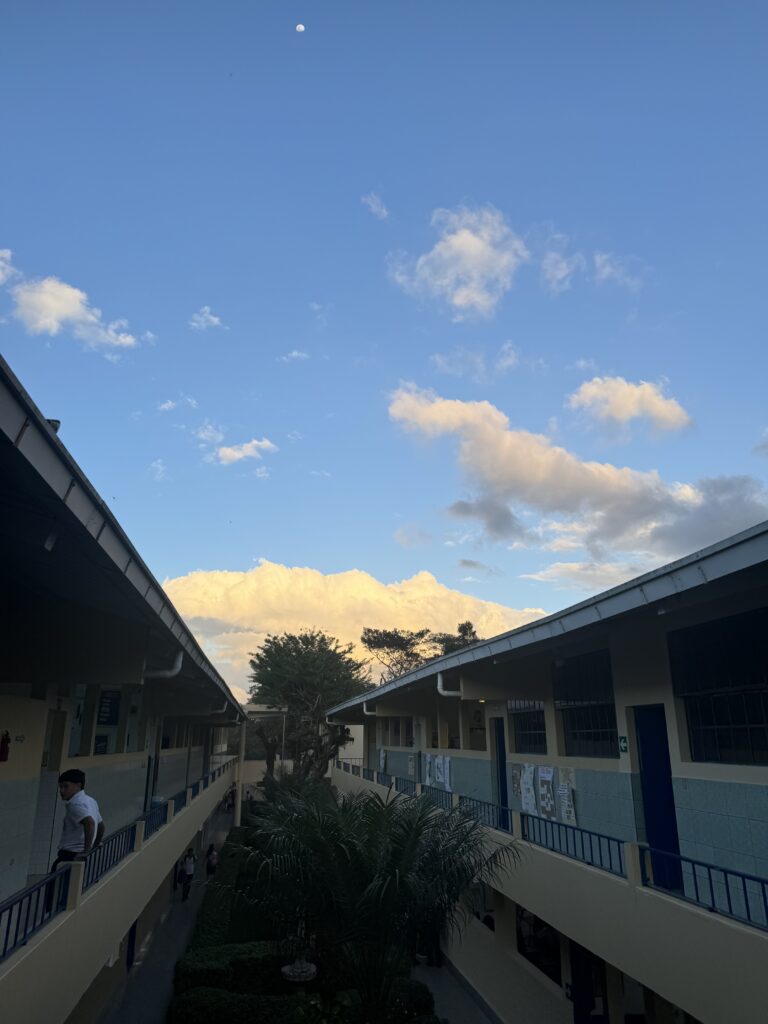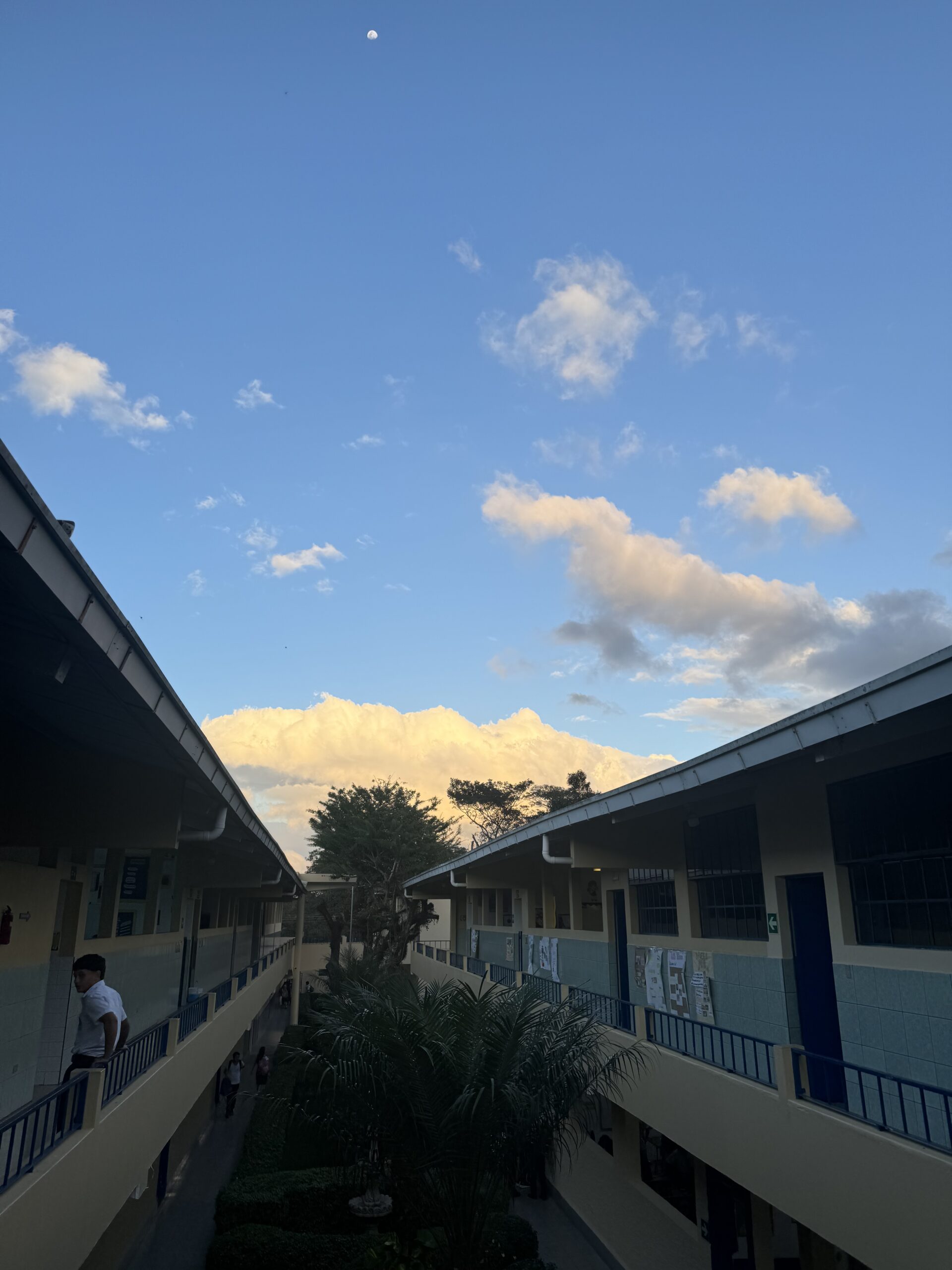
Hi there! I’m happy to be back, giving you another update of life in Esquipulas. It seems I’ve been overthinking about doing blog posts recently and have been hesitant to write anything new for concern that it might not be very well written, or below my standards. However, this has just resulted in me not writing anything at all, which is obviously contrary to the purpose of having a blog. So, this post might be a little more ramble-y than previous entries, but hey at this point its better for me to just put words on the page (or screen in this case).
So, what have I been up to lately? Well, the new school year started officially on January 17th, and I have been very busy with classes since that date. I’m starting to feel more in the groove of classes, which is certainly a nice thing.
The way Fredi and I are teaching this year is similar in some ways and different in others. Last year, we were sharing all of our classes, planning and teaching together. This year, we decided we wanted to each have the opportunity to run our classes in our own unique way, so we decided to split them up. Between the two of us, we have 6 classes, 2 groups in each of the 3 grades that are more or less equivalent to high school in the U.S. Since each grade has an “A” class and a “B” class, we decided to simply divide it up so that I teach all the “A” classes, and Fredi teaches all the “B” classes.
While we are each in charge of our own classes, we are still planning all of these classes together, so ideally, we are doing the same activities in each class. Additionally, we are both in the room at the same time for each class, but whoever is in charge of that class leads the lesson. This means that when we are in a “B” class, I usually hang back while Fredi leads the lesson, and jump in if students have questions while Fredi is talking, or clarify anything if Fredi asks that of me. All of this of course happens vice versa when we are in an “A” class. Lastly, we are each in charge of grading the respective work of each of our classes.
So how has it been going so far? Honestly, it’s been great. Planning things together assures that both of our classes are on relatively the same track, and allows us to help each other through the lesson during the actual class time, while each person being in charge of their own classes allows us to run the class in our own unique way, without worrying about steamrolling or stepping on the toes of the other teacher. We’ve both been very pleased with the dynamic it has provided for us as teachers thus far.
So, what have we been doing in class thus far? Well, we decided to start out the bimester (if you remember from previous posts, the year is divided into four bimesters) with a sort of workshop on pronunciation. We tried to teach the students a bit of phonetics, focusing on how to form some of the more difficult English phonemes. It was a very interesting unit, and really made me think about how much harder it is to properly learn English pronunciation if your first language is Spanish, compared to the other way around. English speakers are very lucky when we are learning Spanish, as there are really only two Spanish phonemes that don’t exist in English, those being the ñ, and the rolled “r” in words like “perrito”. Native Spanish speakers have to learn how to make a lot more new sounds when learning English. From our weird short “a” in words like “cat”, to the “g” in “giant”, to the ever-troublesome “R”, the list goes on and on.
That being said, we did what we could to give the students a good foundation in the pronunciation of these new sounds, and I got to have a bit of fun quizzing them on what they learned by having them read excerpts from a few English books I brought here.

Since then, we’ve been moving on to more grammar. We have a new book that we are using this year, and we’ve mainly been planning our lessons around the content of this book. Comparing last year’s book to this one, the one we are using currently is a little bit less organized than the previous, in that each unit doesn’t really have a clear grammatical focus. However, this is kind of a benefit, as various grammar concepts are frequently revisited, allowing ideas to be reinforced constantly so the students aren’t forgetting them. There is also plenty of new vocabulary in each chapter, and we are encouraging students to make flashcards to practice the new words they encounter in each chapter. I suppose time will tell how effective all this is.
As for my personal teaching philosophy, that too has changed since last school year. When I first arrived here, I was very focused on trying to iron certain concepts into the student’s brain, but I have discovered with the EXTREMELY limited time we have in the classroom each week, I simply cant expect that students are going to be able to pin down all the specific details of whatever subject I’m teaching them.
Instead, I’m focusing more on a system of constant, positive reinforcement. Positive is of course one of the key words here. One of the traits of these students that Fredi and I picked up on very quickly is that they are deathly afraid of failure. Many of them are extremely nervous to participate in class, because they think that if they get something wrong, we will take points away, and at the end of last bimester several students were literally begging Fredi and I to let them pass the class. I don’t know if it’s their upbringing, the school system, or just the culture itself that made them this way, but Fredi and I have decided that we are not going to let our class be a place of stress for these kids. We only have an hour and ten minutes of instruction time per class per week, so it’s pointless to try and do anything super rigorous, as if would just make their fears become reality if we did.
Instead, our goal is to make this class pretty much entirely participation based. Ideally, as long as students complete every activity we assign to them, following the guidelines we set, they could literally get a zero on the final exam (which we are required to give) and still pass the class. I want the final exam to be the only thing they do in the class where they can lose points for getting something wrong. During class time and in doing their homework, I want them to be constantly making mistakes that they can learn from, and I hope they can embrace the idea of learning to fail in this language. That was how I learned Spanish, and I think many would argue that mistakes are the ONLY way to learn a new language. Failure is an inevitability, and the way I see it, the sooner these students figure that out, and learn how to learn from their failure, the more they will excel in ALL their classes, not just English.
With all that in mind, I’d say my main goals for this bimester will be increasing the student’s confidence in their own abilities, decreasing their unnecessary fear of failure, and instilling good practice habits in the students. I’m sure for many students it will take a very long time for them to feel confident in their abilities, but hopefully with constant positive reinforcement from me, they will feel more encouraged to put themselves out there, make mistakes, and actually learn from it.
So, there you have it! A relatively brief recap of what’s been happening at Colegio San Benito. Outside of school, I’ve been trying to hike around more during the weekends to see some of the natural beauty that surrounds Esquipulas. Last Saturday I discovered this absolute gem in the mountains to the south of town (pictures)




I’ve also been practicing music a lot more, and I even started a new Instagram page dedicated to documenting the weird stuff I make with the instruments I find in the monastery, as well as my general progress in the instruments I practice more regularly.
It’s hard to believe I’m now past the 6-month barrier. Being back in school is definitely speeding up the flow of time, so it will be important to me to make the most of the rest of my time here. Getting the time to reflect and write stuff like this is very good for me. If you made it all the way here, thanks for reading, and I’ll see you next time!
Más vale pasar por tonto una vez como que toda la vida
Better to seem stupid once than to remain so for your whole life
Hermano Abraham
